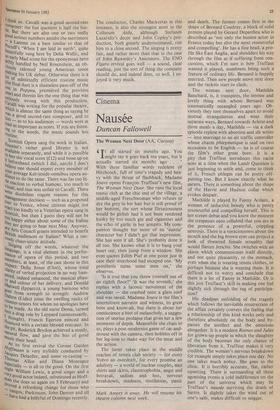Cinema
Nausee
Duncan Fallowell
The Woman Next Door (AA, Curzon)
crt all started six months ago. You might say it goes back ten years, but it actually started six months ago . .
With these familiar words redolent of Hitchcock, full of time's tragedy and hea- vy with the threat of flashback, Madame Jouve opens Francois Truffaut's new film, The Woman Next Door. She runs the local tennis club at the chic end of the village, a middle-aged Frenchwoman who refuses to dye the grey in her hair but is still proud of her bottom, the sort whose flirtatiousness would be girlish had it not been rendered husky by too much gin and cigarettes and the echo of garlic in her armpits. My com- panion thought her more of an 'auntie' character but I didn't get that impression. She has seen it all. She's probably done it all too. She knows what it is to bang your heart out, then jump from a window. She even quotes Edith Piaf at one point just in case their sisterhood had escaped one. 'My prosthesis turns some men on,' she observes.
'Is it true that you threw yourself out of an eighth floor?' It was the seventh,' she replies with a laconic movement of the shoulder — she crashed onto a glass roof and was saved. Madame Jouve is the film's intermittent narrator and witness, its great bore and know-all, but there is about her omniscience a hint of melancholy, a sugges- tion of uterine prolapse that gives her a few moments of depth. Meanwhile she chats to us, plays a post-modernist game of cat-and- mouse with the camera, then hobbles off in her leg-iron to make way for the meat and the action.
The latter takes place in the middle reaches of tennis club society — for every Volvo an overdraft, for every promise an adultery — a world of nuclear couples, nice shirts and skirts, claustrophobia, angst and betrayal, sadism and lust, nervous breakdown, madness, mutilation, panic Mark Amory is away. He will resume his theatre column next week. and death. The former comes first in the shape of Bernard Coudray, a block of solid protein played by Gerard Depardieu who is described as 'not only the busiest actor in France today but also the most resourceful and compelling'. He has a fine head, a pro- file like East Anglia, and shoulders his way through the film as if suffering from con- cussion, which I'm sure is how Truffaut wanted it played, numbness being such a feature of ordinary life. Bernard is happily married. Then new people move next door and the rackets start to clash.
The woman next door, Mathilde Bauchard, is, it transpires, the intense and lovely thing with whom Bernard was traumatically entangled years ago. Ob- viously they tore themselves apart to avoid mutual strangulation and went their separate ways, Bernard towards Arlette and three meals a day, Mathilde — via a dark episode replete with abortion and slit wrists — into marriage to an air traffic controller whose charm phlegmatique is said on two occasions to be English — he is of course the film's other great bore. It is a pity that Truffaut introduces this racist note at a time when the Lamb Question is just beginning to settle and, come to think of it, French phlegm can be pretty off- putting too. But I know exactly what he means. There is something about the shape of the Harvie and Hudson collar which evokes despair.
Mathilde is played by Fanny Ardant, a woman of seductive beauty who is pretty resourceful and compelling herself. This is her screen debut and you know the moment she trespasses onto celluloid that you are in the presence of a powerful, crippling neurosis. There is a voraciousness about the mouth and the big brown eyes can project a look of thwarted female sexuality that would flatten Jericho. She twitches with an alarm which communicates itself directly, and not quite pleasantly, to the stomach, even when she is wearing tennis clothes, or perhaps because she is wearing them. It is difficult not to worry and conclude that there is a lot of Fanny in Mathilde. Or is this just Truffaut's skill in making one feel slightly sick through the tug of participa- tion?
His deadpan unfolding of the tragedy which follows the inevitable resurrection of the affair certainly conveys the feeling that a relationship of this kind works only and therefore absolutely on the body and by- passes the intellect and the emotions altogether. It is a modern Romeo and Juliet for grown-up people in which the slaughter of the body becomes the only chance of liberation from it. Truffaut makes it very credible. The woman's nervous breakdown for example simply takes place one day. No one takes much notice. She goes to the clinic. It is horribly accurate, flat, rather upsetting. There is surrounding all these agonising events a cold indifference on the part of the universe which may be Truffaut's nausee surviving the death of Sartre. It slightly takes the wind out of one's sails, makes difficult to snigger.


































 Previous page
Previous page